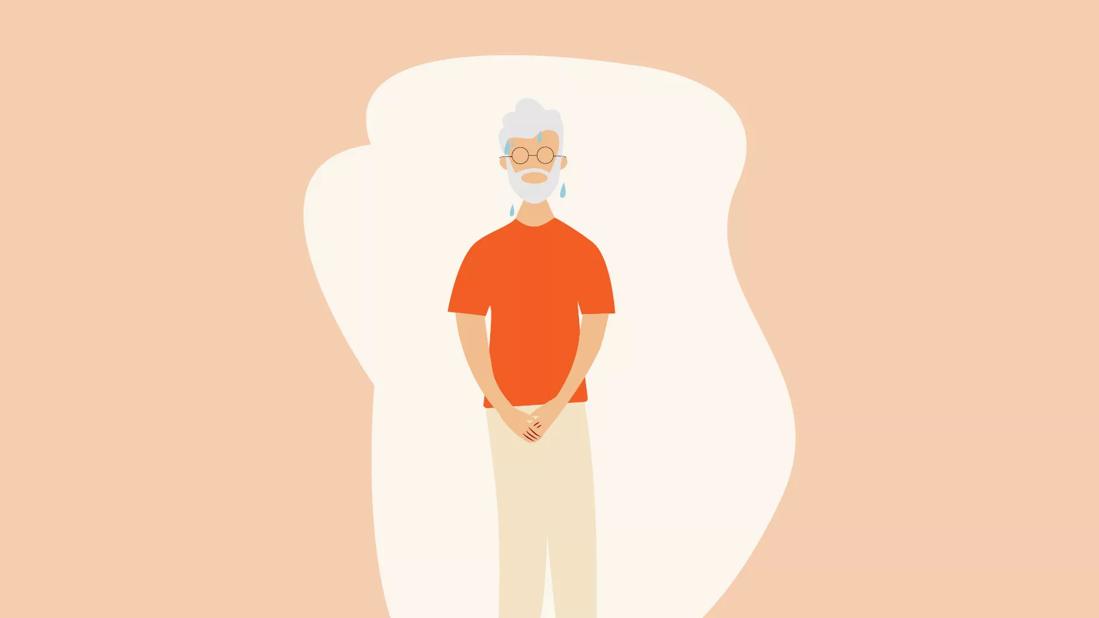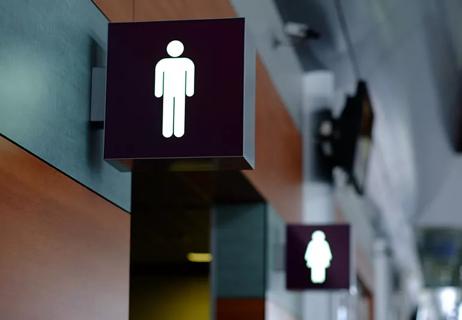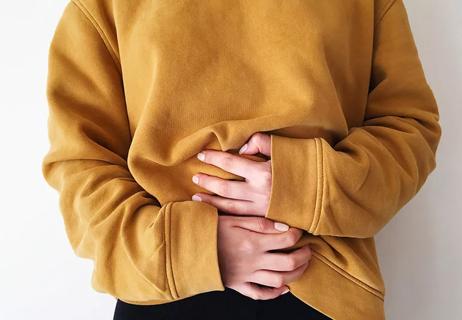Advice to help you go with the flow

Going to the bathroom is something you take for granted — until suddenly, you can’t (or you can’t do it very easily). It’s surprisingly common for men to have trouble peeing, especially as they age into their 50s and beyond.
Advertisement
Cleveland Clinic is a non-profit academic medical center. Advertising on our site helps support our mission. We do not endorse non-Cleveland Clinic products or services. Policy
Don’t just grit your teeth and ignore the situation, says urologist Brad Gill, MD. There are ways to deal with this inconvenient issue so that you can … well, get back into the flow of life.
So, let’s talk about peeing problems.
An enlarged prostate is, by far, the top reason men have trouble peeing. The prostate gland sits right below the bladder. Urine travels from the bladder through a channel that runs right through the prostate to the urethra, where it exits the body.
As men age, the prostate gets larger — and that has consequences. “That growth squeezes the channel within the prostate, making it narrower and harder for urine to pass through,” says Dr. Gill. “It’s a slow change, but it’s one you’ll eventually notice when you’re in the bathroom.”
An enlarged prostate can lead to a variety of symptoms, including:
When it’s hard to pee, you’re less likely to empty your bladder during a restroom visit. That can lead to more frequent (and increasingly frustrating) trips to urinate, and even dribbles in your underwear or embarrassing “accidents” or leakage.
Advertisement
There’s no way to prevent an enlarged prostate. (Again, it’s something that happens naturally.) But if you’re having urinary symptoms, there are plenty of options to help get things back to flowing right.
Drink fluids regularly to stay hydrated, but remember this: The more fluid you gulp down, the more often you’ll have to go — especially if it’s a type of fluid that irritates the bladder. So, be smart about what you drink and when you drink it. For instance:
Use the bathroom regularly throughout the day. “When you have to go, go,” says Dr. Gill. “Don’t hold it in because the bladder is not as patient as it was when you were younger.”
In general, your bladder should be emptied every two to three hours — a pace rarely encouraged in life. “From a young age, society teaches us to hold our urine,” notes Dr. Gill. “Think about grade school and your teacher telling you it’s not time for a bathroom break yet.”
If you feel like you can’t fully empty your bladder, the “double void” may be the right move for you.
“After you finish going to the bathroom, wait 30 seconds to a minute and then try to squeeze out a little bit more,” advises Dr. Gill. “That can help empty the bladder more completely, which can give you more time before your next visit.”
Basically, think of your bladder like a bucket under a leaky pipe: If you only empty it halfway, you need to empty it twice as often to keep it from overflowing.
Make sure going to the bathroom is the very last thing you do before bedtime. Emptying out before you go to sleep means it will take the bladder longer to fill up (and reach capacity) while you’re in bed.
On a side note, if you are urinating very frequently overnight — say, three or four times (or more) — you may have sleep apnea.
Often associated with snoring, sleep apnea is a condition where breathing can pause. This makes the body produce more urine overnight and causes you to wake frequently. This may lead to the habit of routinely getting out of bed and going to the bathroom.
Advertisement
Some herbs and nutritional supplements are marketed for prostate health, but study after study raises doubts about their true effectiveness. In fact, in some instances, supplements may even lead to prostate problems.
Bottom line? Don’t count on finding a “magic pill” for prostate health in the vitamin and supplement aisle. (However, there are medications that may help with this.)
While those tips might help you manage stream struggles, they’re no substitute for what really needs to be done: “If you’re having bothersome symptoms, see a urologist,” states Dr. Gill. “Don’t just ignore it.”
Trouble urinating can be more than just a big inconvenience, after all. It can also negatively affect your health or be a sign of a potentially more serious medical issue.
A prolonged blockage can back up in your bladder and then put pressure on your kidneys, which can cause permanent damage over time, says Dr. Gill. Additionally, you may also be more likely to get urinary tract infections and stones in your bladder.
And while an enlarged prostate is typically the cause of urinary flow issues, it’s not always the culprit. Though less common, some types of cancer and various infections can make it hard to go.
Advertisement
Overactive bladder and bladder irritants are also frequent causes of urinary urgency and urinary frequency.
If you see blood in your pee, get on the phone and schedule an appointment with your doctor. “Bloody urine is never normal and is always something that warrants getting checked out right away,” stresses Dr. Gill.
Ditto for if you’re unable to urinate at all.
Now, the good news. If your growing prostate is making it hard to pee, there are several treatment options that work well to relieve symptoms:
Advertisement
“Problems urinating aren’t normal, but it’s an everyday thing that needs to be talked about,” says Dr. Gill. “Don’t struggle with your symptoms or simply decide to put up with the bother. There’s a list of things that could be going wrong down there.
“So be proactive, talk to your doctors and let us help you figure out how to make things better.”

Sign up for our Health Essentials emails for expert guidance on nutrition, fitness, sleep, skin care and more.
Learn more about our editorial process.
Advertisement

An overactive bladder, UTI, kidney stones or an enlarged prostate can affect how you urinate

The short answer from a women’s health practitioner

These first-line treatments may do the trick

A variety of factors can cause temporary or more lasting changes in penis length

An unexplained lump, swelling, discomfort or changes to your testicles shouldn’t be ignored

As the stalky vegetable breaks down, it leaves behind sulfuric byproducts that can make your pee stink

Arousal without orgasm can be uncomfortable, but it’s no reason to pressure sexual interactions

Most of the time, beeturia is a curiosity, not a concern

Even small moments of time outdoors can help reduce stress, boost mood and restore a sense of calm

A correct prescription helps your eyes see clearly — but as natural changes occur, you may need stronger or different eyeglasses

Both are medical emergencies, but they are very distinct events with different causes